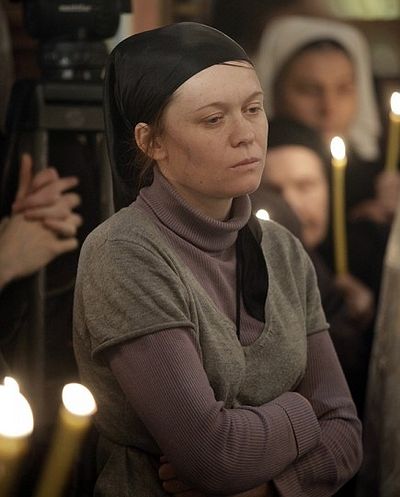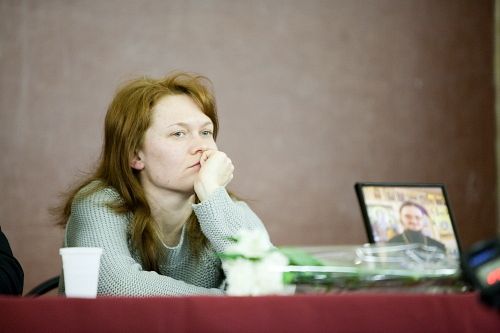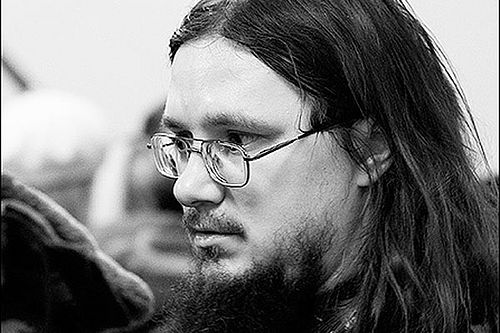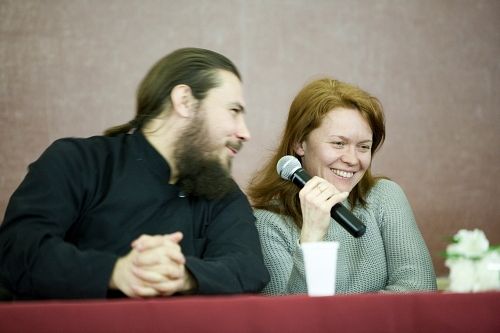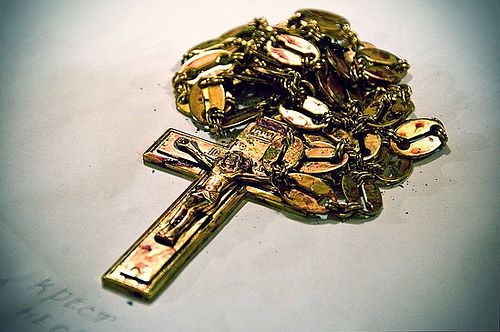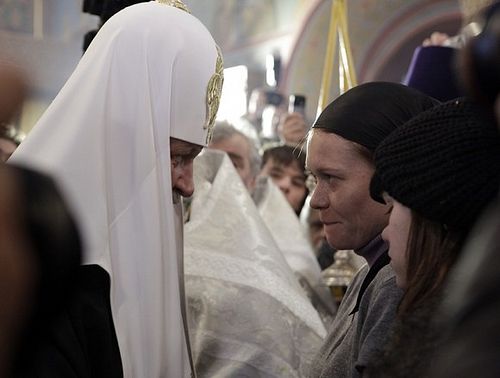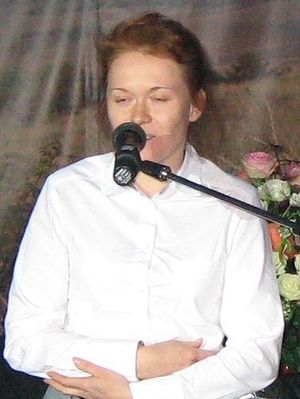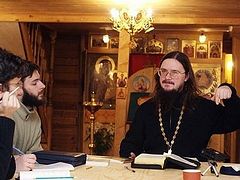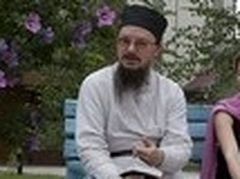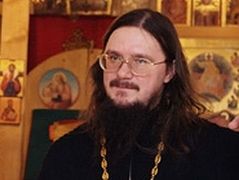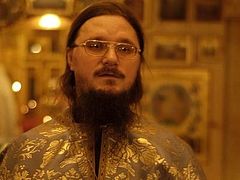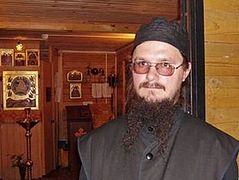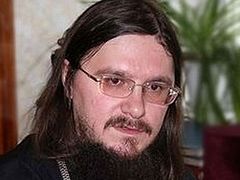This year marks the eighth anniversary of the martyrdom of the missionary Moscow priest Daniel Sysoev, who was shot in the church he built by a Muslim who was angered by Fr. Daniel’s ability to convert followers of Islam, on the evening of November 19, 2009. He died in the hospital early the following morning.
Matushka Julia, Fr. Daniel’s wife, has agreed to share her memories of her husband. Her words here are a frank monologue, a canvas woven from her personal diary.
Memories of the events a year ago are very hard. The wounds remain, and my heart feels the pain.
I remember that evening almost minute by minute—even what I bought in the store, what I was thinking about, when I got home, my last call to him, and his last words: “About forty minutes.” And forty minutes later, the cold dial tone on the line—he didn’t answer anymore. I called him a few minutes after he was shot. Then that first horrible night: the church, the police perimeter, the interrogation, the scarlet puddle of blood on the floor. His unfinished tea in his office, the open laptop. The sleepless night, sunrise, and further—the real horror. Here are excerpts from my journal—memorials of those sorrowful days.
November 19, 2009
Where did my prayer rope disappear to?
It disappeared. It disappeared in a completely mysterious manner—I had it, and now it’s gone. It served me faithfully for several years. It migrated from one car to another. It dried out and spread out, but its mysterious and pleasant warmth always comforted me. It was always warm, so warm, like a relic exuding invisible light which warms all who come to it. It was apparently connected to someone by prayer, and was released into the world as another small weapon against the eternal night.
Where it came from I don’t know. Lately it seemed to me that I always had it, but that’s not true. I had another prayer rope before it, which always disappeared suddenly and under mysterious circumstances.
I never bought a prayer rope—they would always find me, and come to me, and leave me whenever I stopped praying, or when my life had been reduced to the hustle and bustle. All my prayer ropes had the same number—thirty—no more, no less. That’s all I needed.
My first prayer rope was given to me at Optina, but I don’t remember who exactly gave it to me.
Optina, Optina—it was the period of the beginning of my coming to faith. I could stand in church for five hours in a row then, without fatigue or laziness. I could get up at five in the morning, in the cold blue twilight, when my teeth would chatter from the cold, and my body would shiver uncontrollably, to swim in the frozen spring, and then as if on wings go to the skete for the early Liturgy and stand there, not feeling my legs underneath me, listening attentively to every word of the brothers’ harmonious singing.
It, my first prayer rope, disappeared when I went to see the spiritual father of my future husband, still my future fiancé, for a blessing to become friends with my future fiancé. I was planning to get married.
Then I had another, which appeared and disappeared, not even creating any memories of itself. But this, my last one, was with me for a long time. I lost it several times, and it always returned to me.
One time I found it in a puddle near the church. I picked it up, clutched it in my first, so wet and dirty, and it seemed to me I had almost lost something near to my heart.
Another time I found it in a church store on the counter. It was nestled there, like a lost mitten, quietly waiting for me.
“Oh, it’s my prayer rope!” I cried out with delight.
“It’s yours?” the candle lady asked. “Someone brought it here—they found it near the church.”
It was perhaps the only time when strangers saw it on me. I never showed it to people for any reason.
From then on, I never took it out of the car, and I don’t know how it ended up by the church both these times; it was always around the gearshift, waiting for that moment when my hand would begin to automatically reach for it, and my heart would throb in my chest in hunger for a word to God.
And then once I saw with horror that it was gone. The place where it usually lay was unusually empty. I was struck with disbelief.
“Maybe it fell underneath,” I thought, searching thoroughly, under the seat, in the last fragile hope of finding it there.
It disappeared, it was gone, it left me, because of my vanity, because of not forgiving offenses. I never buy prayer ropes. I will wait for the Lord to give me one again. Whether it will be a new one or my old worn out one returning to me again—I don’t know.
I really miss it. Maybe the Lord will return it to me?
***
Having written this story, I found it in the car in the most visible place. Did I know it was the last day of the earthly life of my beloved husband?
We didn’t know. What premonitions were in his heart is hard for me to say. He had shared something with me in these final gloomy November days.
November 21, 2009
He has two injuries—in the neck, which didn’t go all the way through, and in the back of the head, which did. It was a fatal shot. I still have his blood-stained pectoral cross—it’s lying in the altar. The whole time I slept 2.5 hours. They were questioning me the whole time—the police, the FSB,1 and others. There’s a crowd of journalists running after me. I haven’t taken any sedatives, because I need to have a sober head and maintain my composure, weighing every word. Everyone wants to go fish and catch something.
The questioning is going to continue for a long time. I can’t get sluggish.
November 22, 2009
We stopped by the deserted apartment for a couple of hours. The whole night I was at his grave and at the early Liturgy.
I found the leftovers from our last dinner in the fridge. I had made sushi, and for some reason it hadn’t gone bad. Wednesday was the last time we had dinner together. Late, almost 12:00.
He didn’t come to dinner on Thursday. If someone had called me from the church immediately after it happened, I would have reached him alive! He lived—and it’s a miracle—almost an hour after being shot in the neck and right through his head. But no one called me!!! Why? I have more questions than answers. These days are lost time—it is continuous pain and sorrow.
It was a joy, almost like Pascha, when after vesting him in the morgue, they let me see his face. It was a miracle that, despite the perforating wound, the Lord preserved his face unharmed, without any bruising, as if alive.
When I saw him the first time, he smiled at me. At that moment, it seemed to me our separation was over, and we would now be together again. That is what I thought. I examined every line on his face, so familiar and dear to my heart. Even that familiar hair on his mustache, which always grew out wrong: I always clipped the hair for him, so it didn’t stick out when I trimmed his mustache. He was smiling, only it was so strange, why he was so cold.
When we brought him to the church and they changed the aer2 on his face (because it was supposed to be mine, which I had sewn for the church), his face was already rigid.
On Saturday evening we brought the girls and closed ourselves up in the church. When they removed the aer from his face, he was smiling again. He was very pale. The girls were sobbing, and our little girl did not immediately dare to go closer to papa and touch his face. But then she calmed down, stretched out her hand towards him, touched his cheeks, and said, “Papa”…
His bloody cross is on the altar—the cross which he had bought the day before his death in place of the one stolen out of our car.
I think we went to the movies with Batushka on November 8 to see “Tsar.” I remember I was touched by the scene of the burial of Metropolitan Philip; tears were running down my cheeks, and I tried to make sure my husband didn’t see them. Did I know that two weeks later I would be at my husband’s funeral?
It was our last trip to the movies. Then, leaving the theater, we discussed the film, and when we got in the car, we saw that the window was broken and Batushka’s bag was stolen, which had nothing valuable except his pectoral cross.
The next day, Fr. Daniel flew to Serbia and joyously called me from the Monastery of St. Angelina, saying he had bought a pendant with an icon of the saint for his Angelinas—his daughter and mother-in-law…
I ironed his clean cassock, and he put on his new cross—it was Wednesday morning, or maybe Thursday, the last day of his life—I don’t remember exactly anymore. I said then how beautiful he is now, and that I want to always see him like that.
The remains of this cassock were returned to me from the investigative department, and now it’s hanging in the church. Why remains? Because it was all ragged—they had to cut it when they took it off him in the ICU. His bloody stole is still in the investigative department. Who knows when they’ll give it back. They promised to give it back after the investigation, but I’m really scared they won’t give it back, or they’ll lose it.
I saw his stuff when I was looking for his passport; everything was cut and covered in blood, and his cell phone was ringing every minute in his pants pocket. The first day, people were calling him on the phone. Why were they calling when they already knew what happened, when every channel was broadcasting the big news? Probably because they didn’t believe it, and wanted to assure themselves and hear that it was a mistake.
I also called him one night on his cell phone, already after his burial, just because I was so used to us calling one another, and I really wanted to hear his voice…
The Lord granted him martyrdom and washed away all his sins, because his sins were out of keeping with what he was doing. Today I saw a man of Eastern appearance weeping over his grave. I have no words…
Why was it necessary to go through such terrible suffering, to understand how strongly we loved one another? And this love is now quite unearthly…
…If not for Fr. Daniel and his support, I don’t know what would be. I don’t pity myself, but I pity my children terribly. Our youngest girl didn’t understand at first that it was papa. She turned away, and then when she looked closely, she recognized him and touched his cheek with her finger, and said, “Papa.” She always says it so movingly—“papa.” She was born right in front of his eyes, and he was running around the delivery room saying, “She smiled at me, she smiled at me first.” My heart breaks at the thought that she won’t know him.
November 24, 2009
It’s so hard. I was watching different broadcasts all day. Angelina recognized papa on some talk show and began to say, “Papa, papa!” and some babbling, something like “Come here.” Then she grabbed his cassock, pressed it to herself, and said, “Papa.”
Watching that, I’m afraid I’ll fall apart.
Fr. Daniel comforts me. When they brought his casket to the church at the cemetery, I again fell into such sorrow—I can’t articulate it. And suddenly under my feet—a bouquet of violet irises. I immediately understood that it was from him. He gave me the same kind of irises on our first date. In his last days he told me he wanted to give me flowers, but he didn’t give them, and he hadn’t for a long time, during all the commotion in our lives. And now he gave them to me.
If you see photos from his burial, I’m there with violet irises…
A batushka from Washington just called me. He said much that was comforting, and not just comforting, but with a sense that it was as if Fr. Daniel was answering my questions.
November 27, 2009
I found my cross with the string today. I picked up a few things from the prosecutor’s office yesterday; they gave me his cassock, belt, prayer rope, and some clothes that I was told to burn, according to the rules. His cross and the documents from the car weren’t there; it turns out they were in the hospital and we found them yesterday. Batushka somehow arranged everything himself…
They gave me his stole to hold in my hands yesterday, and I kissed it. The smell of blood is so strong. They didn’t give it to me because they found a bullet hole on it. It is “material evidence”…
And there turns out to have been another detail. It’s difficult to write about it. He had the choice not to die. When this guy shouted, “Where is Sysoev?” Batushka came out of the altar. He understood where he was going! He could have not left the altar. They have stairs in the altar to the second floor. He could have run up there, and the killer wouldn’t have been able to find him: There was little time and they had already pressed the panic button. But Fr. Daniel left the altar…
No, everything was defined. His death has taught us a lot…
The most painful thing is to while away the evenings, becoming long and futile—evenings that used to pass in the usual anticipation of his arrival.
I went to see Vladyka today, then I decided to go for a stroll. Fr. Daniel loved Ostozhenka, the Church of St. Elijah on Obidensky Alley, and Prechistenka Alley. I walked—a gray sky, warm and damp. I recalled various episodes connected with these places and Batushka. And I thought all about how suddenly my life changed overnight, and about how I can’t grasp it and accept it with my mind. Only one thing I understood, that now I have only my children holding me to Earth. My soul longs for there where he is. He always longed to go there, while I was digging in the earth like a worm…
Fr. Daniel always strove for holiness and spoke about it to others. To him, simple salvation was not enough. He would say it was wrong to reason, “If only I could be at least on the edge of paradise.”3 For him, the edge was not enough—he wanted the highest glory and the highest reward in Heaven.
Sometimes he would literally shock people who came to be baptized or to baptize their children when he would say, “Do you promise that you will become saints; do you promise to raise your child to be holy?”
In his homilies he often spoke about good deeds by which we earn capital in Heaven, we build a house for ourselves there, and even palaces. It’s no accident that the temporary church was named after the apostle Thomas, who built a heavenly palace for King Gundafor.
March 17, 2010
Four months have passed, and I’m amazed by it: Only four, and it seems to me no less than five years have passed, except these five years have been a continuous and endless winter. And now it’s the middle of March, and there’s cold and frost.
Batushka would tell me to come see him at his grave when things would be especially hard, so I go. I bring him fifteen violet irises; it’s our custom now. Fifteen for our number of years together.
Sometimes it seems like it’s a dream, and sometimes I think that’s all I have left—a grave with flowers.
He always has lots of flowers. Here they stand, frozen, and beaten by the cold, drooping their many-colored heads, overcome by snow.
Someone put a photo of Batushka and burning lanterns. Amazingly, I had described his grave down to the smallest details during Batushka’s life in my novel, which Fr. Daniel blessed and supported me in every way. In the novel I describe the grave of a reposed elder. Here’s the description:
“The elder’s grave was crowned with a simple wooden cross with a little roof, under the cross an inextinguishable lamp flickers in a red lantern, the grave mound was entirely strewn with bouquets of flowers, covered lightly as with powder by white, fluffy snow. The first snow blanketed the ground with a thin, translucent carpet, the many silent snowflakes swirl in the air. An old apple tree with apples turned brown, beaten by the frost, is bent over the cross.”
But who knows what someone who has been shot in the back of the head feels? It’s what I describe in my novel—the execution of a martyr who would not renounce his faith, would not renounce Christ—a martyr killed that way—by a shot to the back of the head. Why I had described that is, perhaps, a mystery, like many others that happen in our lives: the mystery of foreknowledge.
Fr. Daniel and I often spoke about foreknowledge. Once, to my question of why he practically never even took a breath, why he didn’t give himself a day off, he answered, “I’m afraid I won’t have time; I need to do more before it’s too late; I know I’m going to be killed.”
When he turned thirty he said he would live thirty-three years. I questioned him then: How did he have such precision, such knowledge? When he turned thirty-three, our third daughter was born, and perhaps the Lord therefore extended his life by two years, or maybe something else, and it’s a mystery which I’ll probably find out about in the next life.
November 2010
About people
Who are my friends?
Fr. Daniel’s departure has revealed completely unexpected things. People who were close or were considered friends have changed: Some have remained friends, and some have turned their backs, not calling even once for a whole year, and some others have tried to stab me in the back. It’s true what they say, that your friends are known in hard times.
It's better to speak about those who truly became closer. In place of those who turned away, who stooped to low levels, or just remained cold, the Lord sent such wonderful people, the likes of which I never met before. These are people of great love and great sacrifice and purity, who literally became examples and for emulation.
My friends mainly became people I hadn’t known during Fr. Daniel’s life. But they always say that Fr. Daniel himself introduced us. Therefore, the very fact of meeting them is a miracle.
About work
My most important work now is opening the foundation for helping priest families, particularly those left without their breadwinner.
Besides that, the foundation publishes the works of Fr. Daniel and his missionary programs. I realize it’s a difficult work, but I have to do it, because the Lord God has given me through Fr. Daniel some great opportunities that it would be a sin not to take them. That is, I take this activity as work given by God. As in the Parable of the Talents: If I bury this talent in the ground, then I will not receive any reward, but only condemnation.
Thus, I have to do it. I really want to help others, in a purely human way. If people helped me, why shouldn’t I help? It’s my duty!
But to speak of my favorite activity, it’s writing, which I sometimes love to do in my free time. My novel, God Does Not Pass By, will come out soon. It’s the story of an Orthodox girl who has renounced her faith for the sake of her beloved, who takes her to a suicide bomber camp and prepares her as a Shahid.4 But the story has a happy ending. I hope the readers will like the novel. Now I’m writing another novel about witches—about a modern Justina.5
About everyday life
Things are easy for me in terms of finances. Nothing has changed for me in this sense, because Fr. Daniel was a man not of this world, and I’m no stranger to economic concerns, which he never knew. Sometimes it’s hard to make decisions myself, but I always silently ask for Fr. Daniel’s advice, and he answers me.
It’s difficult for me as the head of the family. I live as a I lived; the main thing is to not allow the feeling of loneliness into my heart. A woman becomes lonely when she begins to perceive herself that way.
My main challenge is learning to grow spiritually—it is very difficult. My task is to trust in God in all things, not doing things my own way.
About the children
I have such wonderful children. For any mother her children are wonderful. I have three completely different daughters, not like one another at all. I look at them and I’m amazed: They came from one womb, from one father, and they’re so different, both externally and in terms of characteristics.
All three are like their father, but each in her own way.
Justina, 15, has a load of teenager problems that I hope will be resolved. She loves shopping, hanging out, and generally the company she’s with has an influence on her.
The middle girl, 10, is, as they now say, an indigo child. She’s a completely otherworldly girl, very sensitive to spiritual realities. She thinks only of others, of God, about discoveries, about learning. She has a very adult view and adult thoughts.
And the youngest—not sure yet—she’s only three. She has a domineering and feisty character.
About myself
I have no plans for the future. As they say, if you want to make God laugh, tell Him your plans.
It always seems to me I don’t have enough strength and toughness; I’m already soft and compliant. Alas, I have no courage to speak of. I often lose heart and fall into despair, but I remember the words of Scripture: Rejoice always, in everything give thanks to God (cf. 1 Thess. 5:16-18).
In fact, I am a bird with clipped wings—but other, stronger wings carry me. I really feel his (Fr. Daniel’s) care in everything…
A year has passed and I have realized one thing that I was unable to accept and understand—in the ancient Church they congratulated you with martyrdom. I have felt with all my heart how good it is for Fr. Daniel there!—how he has enormous possibilities for work incommensurate with our earthly standards. Then I understood and realized that I will no longer accept condolences. I accept only congratulations.
And I can’t endure it anymore when they call me a widow. It’s not really true. Of course, by social status, on a Schengen visa application, for a census I am a widow. But it’s not real. I am no widow. And that’s that.

